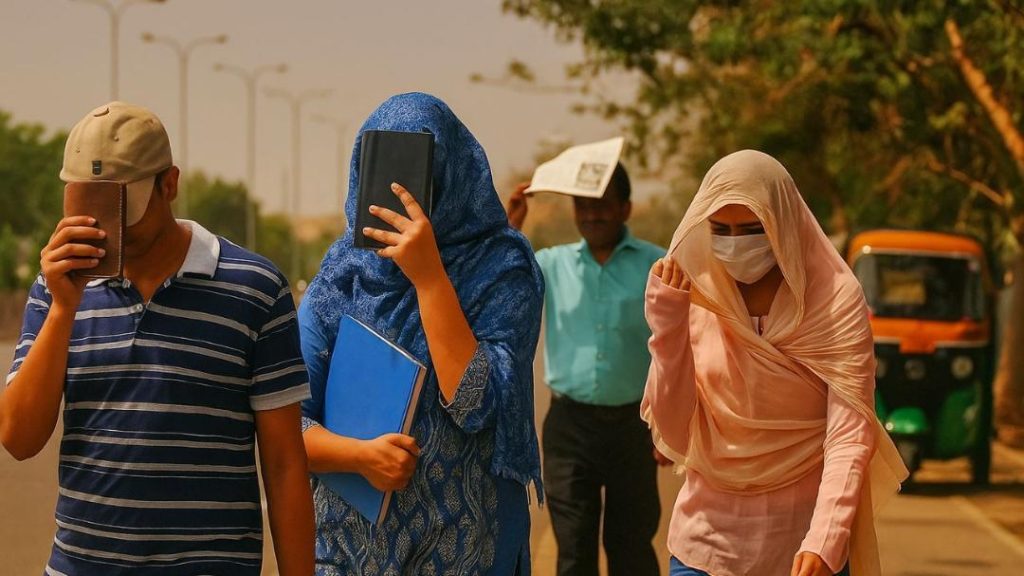
India to See 43% More Extreme Rain, Double Heatwaves by 2030
Climate change is wreaking havoc across the globe, and India is no exception. A recent study has projected that India is likely to witness a significant increase in extreme rainfall events and heatwaves by 2030. According to the study, India is projected to see a 43% rise in extreme rainfall events and a two-fold increase in heatwave days across key urban areas by 2030.
The study, conducted by a team of researchers from the Indian Institute of Tropical Meteorology (IITM), analyzed historical climate data to forecast future extreme weather events in India. The researchers used advanced climate modeling techniques to identify areas that are likely to be affected by climate change.
The findings of the study are alarming, to say the least. The researchers found that eight out of every ten districts in India are likely to experience multiple instances of extreme rainfall by 2030. This increase in extreme rainfall events will not only lead to flash flooding and landslides but also put a significant strain on India’s infrastructure and economy.
Heatwaves, which are another extreme weather event, are also projected to increase dramatically. The study found that heatwave days will increase by two-fold across key urban areas in India by 2030. This will have severe consequences for public health, particularly for vulnerable populations such as the elderly and children.
The study’s findings are based on the assumption that greenhouse gas emissions will continue to rise at their current rate. If emissions are reduced significantly, the study’s projections may be less severe. However, given the current pace of climate change, it is likely that India will experience more frequent and intense extreme weather events.
So, what does this mean for India? The impact of climate change on India’s weather patterns will be far-reaching and devastating. Here are a few potential consequences:
- Increased risk of flash flooding and landslides: With more extreme rainfall events, the risk of flash flooding and landslides will increase dramatically. This will put a significant strain on India’s emergency services and infrastructure.
- Heat-related illnesses and deaths: As heatwaves become more frequent and intense, the risk of heat-related illnesses and deaths will increase. This will have severe consequences for public health, particularly for vulnerable populations.
- Disruption to agriculture: Climate change will have a significant impact on India’s agriculture sector. Rising temperatures and changing precipitation patterns will make it difficult for farmers to predict and prepare for crop yields. This will lead to food insecurity and economic losses.
- Increased migration: As climate change makes it difficult for people to survive in certain areas, there will be an increase in migration to other parts of the country. This will put a significant strain on India’s social services and infrastructure.
So, what can be done to mitigate the effects of climate change on India’s weather patterns? Here are a few potential solutions:
- Reduce greenhouse gas emissions: The most effective way to reduce the impact of climate change is to reduce greenhouse gas emissions. This can be achieved through a transition to renewable energy sources, increasing energy efficiency, and reducing waste.
- Improve disaster preparedness: India needs to improve its disaster preparedness and response capabilities. This includes investing in early warning systems, emergency response teams, and infrastructure that can withstand extreme weather events.
- Support climate-resilient agriculture: India’s agriculture sector needs to be made more climate-resilient. This includes supporting farmers in adopting climate-resilient agricultural practices, providing them with access to climate information, and helping them to develop climate-resilient crops.
- Promote sustainable urban planning: India’s cities need to be designed and planned in a way that takes into account the impacts of climate change. This includes promoting green infrastructure, increasing green spaces, and designing buildings and roads that can withstand extreme weather events.
In conclusion, the study’s findings are a wake-up call for India. Climate change is a real and present threat that requires immediate attention and action. By reducing greenhouse gas emissions, improving disaster preparedness, supporting climate-resilient agriculture, and promoting sustainable urban planning, India can mitigate the effects of climate change and build a more resilient and sustainable future.






